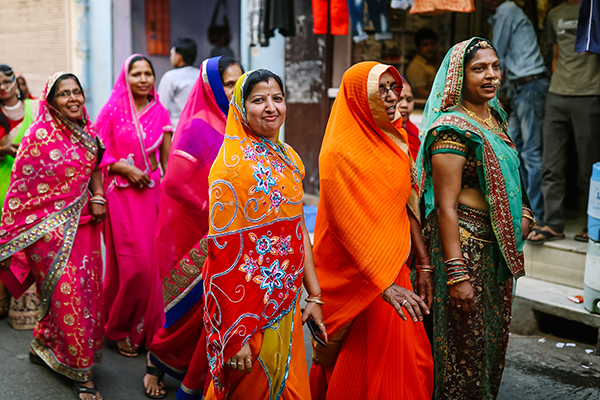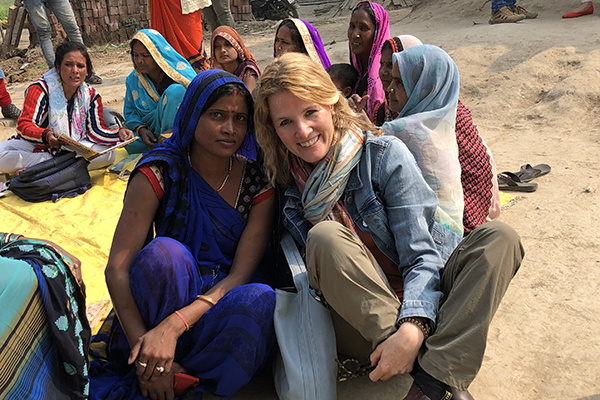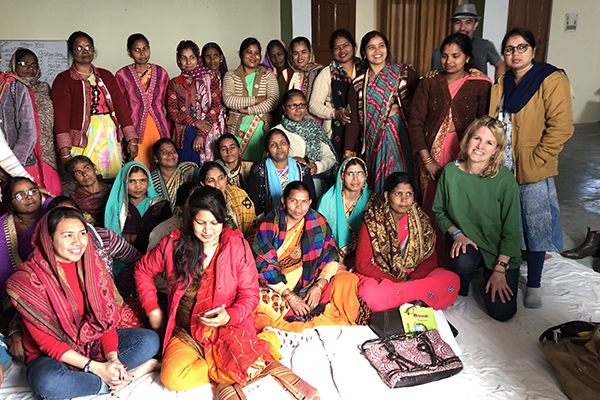The Power of a Movement

It was late in the evening, at the end of our national dinner. Our speakers had shared about their dream to end poverty. I was excited about the atmosphere in the room. There was a sense of community and anticipation, of endless possibilities and inspiration. People were talking and nobody wanted to leave despite the event having finished a half hour before.
Then one of our faithful long-term supporters leaned across the table and asked: “Do you genuinely think ending poverty is possible?”
The question surprised me. Admittedly, I have always been a glass half full kind of person. But if I didn’t believe ending poverty was possible, I wouldn’t make it to the office each morning. I started talking about different ideas, but the supporter leaned even closer and said. “No tangents – do YOU believe it’s possible?”
I took a deep breath, leaned forward, and said, “Yes, but we can’t do it in isolation. It takes a movement.”
There have since been a lot of questions around what exactly this ‘movement’ is. So this article is an exploration of why it takes a movement to end poverty.
But before I talk about movement, I should answer the supporter’s question. Do I genuinely think that ending poverty is possible?
Yes, I do. And interestingly, so does the UN.
In 2015, all United Nations Member States adopted the 17 Sustainable Development Goals (SDGs) – a call to action for all countries, rich and poor, to improve life for people and protect the environment by 20303.
The SDGs address such issues as health, education, climate change, gender equality, and economic growth. But the very first Sustainable Development Goal (SDG) is “To end poverty in all its forms everywhere”.
If we drill down into SDG 1’s targets, we get to some interesting specifics. Target 1.1 is: ‘By 2030, eradicate extreme poverty for all people everywhere, currently measured as people living on less than [US]$1.25 a day.’
Target 1.2 is: ‘By 2030, reduce at least by half the proportion of men, women and children of all ages living in poverty in all its dimensions according to national definitions.’
And Target 1.4 has a curious tie-in with Opportunity: ‘By 2030, ensure that all men and women, in particular the poor and the vulnerable, have equal rights to economic resources, as well as access to basic services, ownership and control over land and other forms of property, inheritance, natural resources, appropriate new technology and financial services, including microfinance.’4
So, when we at Opportunity International say that we don’t want to fight poverty, we want to end it, we are in good company – all 193 member states of the United Nations, in fact.
And this is where we can start talking about a movement. Ending poverty will require more interventions than just microfinance and it will require more than just one organisation. It will require everyone joining forces.
Ending poverty will require more interventions than just microfinance and it will require more than just one organisation. It will require everyone joining forces.
The Oxford Dictionary defines movement as, ‘A group of people working together to advance their shared political, social, or artistic ideas’1; the Cambridge as, ‘A group of people with a particular set of aims’2.
Historic examples of movements include the suffragettes who campaigned for votes for women; the abolitionist movement to abolish slavery; the movement to end apartheid; civil rights movement in the U.S.; and more recent movements include stopping violence against women and the movement led by global youth raising awareness and calling for action on climate change.
When you look at these movements, some common threads emerge. Movements:
- Arise to address areas of social injustice
- Stem from a sense of urgency provoked by key events or the chronic failure of a system
- Call for answers and solutions beyond one person or organisation or even countries
- Depend on voluntary participation
- Have no time frame but are open ended to get the job done
- Draw others in
- Create momentum towards a tipping point.

Movements shift deeply entrenched paradigms. They are not simply a good idea – they gain traction and momentum as increasingly more people see the change as a necessity for the betterment of society.
Movements come before leaders. Great leaders like Nelson Mandela, Martin Luther King Jr, and Mahatma Gandhi, don’t just appear, but rather emerge from an undercurrent of growing social disunity; from social pressure that forces an issue to the forefront and leaders to rise above. Yet they all felt a deep conviction to devote their life to what they believed in – a cause so much bigger than one person, an idea, an organisation. They fought for a fundamental truth and what they knew to be right; something that people were willing to sacrifice for, even with their lives.
It is important to note the difference between movements and campaigns. The NGO world, and indeed the political sphere, often talks in campaigns. But there is a clear difference between the two. A campaign is a seasonal, often temporal goal that seeks a specific immediate outcome. But a movement is deeper. It asks for change – a change in thinking; a change in attitude; a change in and for the world.
A movement asks for change – a change in thinking; a change in attitude; a change in and for the world.
Movements also hold a mirror to society, revealing our true selves and values. They ask us to examine and question what we hold dear and why. They ask us if what we say and do and believe is truly acceptable. The reflection isn’t always what we want to see.
The recent controversy surrounding the treatment of AFL legend Adam Goodes is a prime example of that inward societal examination. The question we’ve been asked is: ‘Are Australian’s inherently racist?’ Staring into that mirror isn’t pretty but if you look closely, you may just see some ripples on the water that has every chance of becoming a solid groundswell of change.
On a lighter note, many have seen the video clip of a man dancing crazily alone at a music festival. But while it’s awkward viewing at first, someone joins him, and then another. Soon, our original dancer is lost amongst a whole crowd that is dancing as one passionate movement. What happened...? Momentum. It built until it reached a critical mass and what was once seen as new or strange became normal (and a lot of fun!).
The Tipping Point, by Malcolm Gladwell, explained that any tipping point is the result of three ingredients:
- The law of a few – all movements have been started by a handful of people who believed change was not only possible but essential
- The 'stickiness' factor – the message was clear, concise and didn’t require a lot of change
- The power of context – individuals feel responsibility that their contribution matters, they no longer see themselves as part of a crowd relying on others to act
The waves of a movement
There is no simple guidebook to movements. Movements are organic, they come from a welling up of need as society changes. But there are certain moments that indicate something is building. Here are some observations on key stages in movements:
- Critical incidents (for example, when Rosa Parks, a black woman, refused to give up her seat on the bus for a white man in Montgomery, Alabama in 1955, the civil rights movement in the US became a mainstream issue)
- A handful of people and organisations take action and key philanthropists take a risk to fund a cause
- Peaceful resistance in media and (sometimes less peaceful) protests on streets raise public awareness
- The voice of the voiceless, first heard as a whisper, soon becomes a shout
- The casting of a vision that catches people's imagination
- Rallying of support and fighting complacency and criticism
- Multiple voices are being broadcast
- Lead gifts paving the way for more action and change
- The broader public supports the cause
- The tidal wave creates change
- History has been made
- The next generation can't imagine things differently – wonders why change did not happen sooner!
Right now, millennials are passionate about climate change. They have inherited the world, know they will soon lead it, and are concerned about what state it is being handed to them. They have organised school strikes, press conferences, global networks, protests, social media campaigns and nothing is stopping the sense of urgency. As a mother of teenagers, I feel inspired by their commitment, their passion, their determination to protect our world from further destruction.
My generation, Generation X, and the Baby Boomers before, started our own battle against poverty with great passion – we can’t lose the sense of urgency in the belief that ending poverty is possible and necessary. We started it, we are the people who can do it, but our job is not done yet. We are climbing up a mountain; and we need to keep climbing, to keep building momentum until we are carried over the mountain or until that mountain is no more.
If we don’t, if we are not willing to take on the challenge of ending systemic poverty, we may as well slide silently down the mountain to face the millions of people currently living in poverty and admit defeat. That is what the younger generation fears; they don’t want to have to admit one day to their own children and to all those who are vulnerable and feel the effects of climate change most keenly, that, while they knew there was a problem, and knew that they could do something about it, that they failed to act.
Right now, two billion people live on less than US$3.20 a day. That is one in four people who are trapped in a cycle of poverty that—if we don’t act—will remain in poverty for generations. The choices we have about careers, education, healthcare, living standards, and food are unimaginable to them.
So, what are we doing about it? What are we doing about an unacceptable level of poverty in a world of abundance? What are we doing about an unequal and unjust distribution of wealth?
Two billion people are depending on us not forgetting them or giving in to complacency. Their lives literally depend on us coming alongside them to help them move out of poverty.
And we’re being watched. The millennials are watching, determining whether we are true to our values, and what we do to uphold our values. They are evaluating whether their lives can make a difference for others based on their observations of the impact of our actions. In a time when depression, lack of meaning and youth suicide are rampant, none of us can afford to be a generation without passion, without belief, convictions, resolve, compassion, or leadership.

So who needs to be behind this movement?
Opportunity International Australia is an organisation committed to ending poverty and we are committed to ending poverty in a way that is smart, sustainable and scalable. We are gathering visionaries and leaders to join the movement to end poverty. We are not doing this in isolation. Nobody owns the global movement to end poverty. We are one wave contributing momentum to an ocean of change.
So what does it take to join the movement?
It will require a heartfelt belief that not only is ending poverty possible, but that we each have a responsibility to do something about it. The underlining force of a movements is a determination and a commitment and passion to provoke change. To use whatever voice, influence, resources, time each individual and organisation can prioritise to create change. We are trying to make it easy for people to get involved, breaking down any barriers holding individuals back to contribute, and we are encouraging collaboration among organisations working on the same goal: to end poverty.
We are appealing to willing hearts to open, and for people with sharp minds and a generous spirit to join forces with us. Let’s have a willingness to not look away. Let’s get uncomfortable; living outside a generally accepted paradigm. And this takes courage. It takes imagination to see things as they could be rather than as they currently are. And believing that this better reality is worth the fight, worth getting uncomfortable for. It takes people creating a new reality rather than living in the past, in complacency, or in escapisms that soothes our minds and feelings with temporary feel good factors that will never leave us satisfied. Because we intuitively know it when things are not right. And they have not been right for a long time. It will require us to transcend politics. It will require Australians to take a stand on global rather than domestic issues and take the concept of mateship beyond our borders.
Join the movement by learning more about Opportunity's work or becomming an ambassador for change.
References:
1. Oxford Dictionary
2. Cambridge Dictionary
3. United Nations, Sustainable Development Goals
4. United Nations, Sustainable Development Goal 1